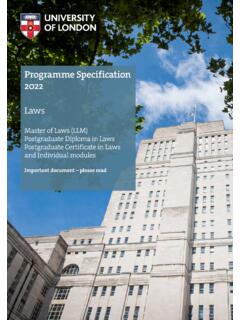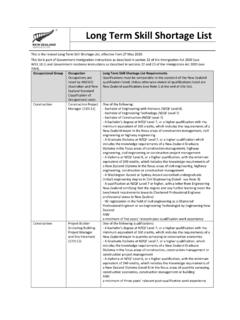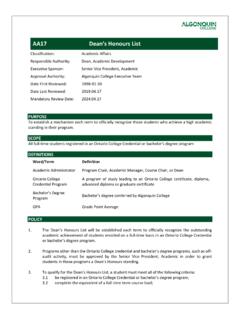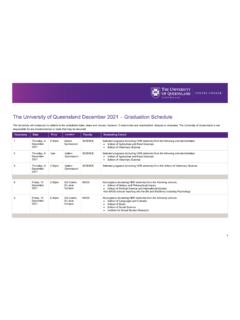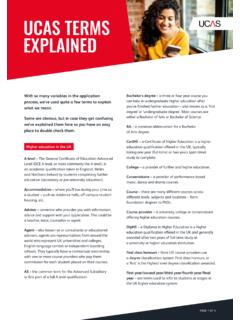Transcription of Programme Specification 2021–2022
1 Programme Specification 2021 2022 Computer ScienceComputer Science (Data Science)Computer Science (Games Development)Computer Science (Machine Learning and Artificial Intelligence)Computer Science (Physical Computing and Internet of Th i ngs)Computer Science (User Experience)Computer Science (Virtual Reality)Computer Science (Web and Mobile Development)BScGraduate DiplomaGraduate CertificateImportant document please read Programme Specification 2021-2022 Computer Science and specialisms (BSc, Graduate Diploma, Graduate Certificate) University of London Page 1 of 31 Contents Important information regarding the Programme Specification .. 2 Title and name of qualifications .. 4 Entrance requirements .. 9 Educational aims and learning outcomes .. 13 Learning, teaching and assessment strategies .. 25 Assessment methods .. 26 Student support and guidance .. 27 Quality evaluation and enhancement.
2 27 After graduation .. 28 Programme Specification 2021-2022 Computer Science and specialisms (BSc, Graduate Diploma, Graduate Certificate) University of London Page 2 of 31 Important information regarding the Programme Specification About this document Last revised: 7 July 2021 The Programme Specification gives a broad outline of the structure and content of the Programme , the entry level qualifications, as well as the learning outcomes students will achieve as they progress. Some of the information referred to in this Programme Specification is included in more detail on the University of London website. Where this is the case, links to the relevant webpage are included. Where links to external organisations are provided, the University of London is not responsible for their content and does not recommend nor necessarily agree with opinions expressed and services provided at those sites.
3 If you have a query about any of the Programme information provided registered students should use the ask a question button in the student portal otherwise the Contact Us button on each webpage should be used. For the Computer Science programmes, you should note the following terminology: Module: Individual units of the Programme are called modules. Each module is a self-contained, formally structured learning experience with a coherent and explicit set of learning outcomes and assessment criteria. Core module: Core modules are central to the teaching and learning of a Programme and may introduce concepts and ideas that appear in the compulsory and optional modules. Compulsory module: A module which must be taken as part of a degree Programme . Optional module: A Level 6 module chosen from a list. Are you affected by US-imposed restrictions? Our suite of BSc Computer Science degrees use creative interactive approaches delivered through Coursera, the world s largest online learning platform, to provide immersive learning experiences.
4 United States export control regulations prevent Coursera from offering services and content to users in certain countries or regions. More information about which countries or regions are affected can be found here. Coursera must enforce this restriction in order to remain in compliance with US law and, for that reason, we advise that all learners check this information before applying to the Programme . Key revisions made Programme specifications are revised annually. The quality committee of Goldsmiths, University of London, as part of its annual review of standards, confirms the Programme structure and the educational aims and learning outcomes, and advises on any development in student support. Significant changes made to the Computer Science Programme Specification 2021-2022 Graduate Certificate and Graduate Diploma awards are now included, prior to their launch in April 2022 Programme Specification 2021-2022 Computer Science and specialisms (BSc, Graduate Diploma, Graduate Certificate) University of London Page 3 of 31 Alternative Assessments during the Coronavirus (COVID-19) Outbreak In these unprecedented times, the University has and continues to respond quickly to the impact of COVID-19, which has resulted in changes to our assessment processes.
5 In line with our current General Regulations, the University may offer you alternative assessments where necessary. This includes holding online timed assessments in place of written examinations, which are usually held at examination centres. Please note that this statement replaces any published information relating to assessments or written examinations in any of our materials including the website. Previously published materials relating to examinations should therefore be read in conjunction with this statement. The University of London continues to work towards supporting the academic progression of all its students. The University also continues to be mindful of the health and wellbeing of its students during this pandemic, whilst protecting the academic standards of its awards. Programme Specification 2021-2022 Computer Science and specialisms (BSc, Graduate Diploma, Graduate Certificate) University of London Page 4 of 31 Title and name of qualifications Undergraduate degrees of the University of London are awarded with honours .
6 The award certificate will indicate the level of the academic performance ( honours ) achieved by classifying the award. The classification of the degree will be based on the ratified marks from the completed assessments. The standard classification system for bachelor s degrees with honours is: First-Class; Upper Second-Class; Lower Second-Class; Third-Class. A Pass Degree or Ordinary Degree is a degree without honours . The classification system for Graduate Diploma and Graduate Certificates is: Distinction Merit Pass Specific rules for the classification of awards are given in the Programme Regulations, under Scheme of Award. Programme name Computer Science and specialisms Award titles bachelor of Science: bachelor of Science in Computer Science bachelor of Science in Computer Science (Data Science) bachelor of Science in Computer Science (Machine Learning and Artificial Intelligence) bachelor of Science in Computer Science (Web and Mobile Development) bachelor of Science in Computer Science (User Experience) bachelor of Science in Computer Science (Physical Computing and The Internet of Things) bachelor of Science in Computer Science (Games Development) bachelor of Science in Computer Science (Virtual Reality) The Diploma of Higher Education and Certificate of Higher Education are only available as exit/intermediate qualifications to students studying a bachelor of Science Programme .
7 The bachelor of Science (unclassified/pass degree) is only available as an exit qualification. bachelor of Science in Computer Science (unclassified/pass degree) Diploma of Higher Education in Computer Science Certificate of Higher Education in Computer Science Programme Specification 2021-2022 Computer Science and specialisms (BSc, Graduate Diploma, Graduate Certificate) University of London Page 5 of 31 Graduate Diploma and Graduate Certificate: Graduate Diploma in Data Science Graduate Diploma in Machine Learning and Artificial Intelligence Graduate Diploma in Web Development Graduate Diploma in User Experience Graduate Diploma in Mobile Development Graduate Diploma in Physical Computing and The Internet of Things Graduate Diploma in Games Development Graduate Diploma in Virtual Reality Graduate Certificate in Data Science Graduate Certificate in Machine Learning and Artificial Intelligence Graduate Certificate in Web Development Graduate Certificate in User Experience Graduate Certificate in Mobile Development Graduate Certificate in Physical Computing and The Internet of Things Graduate Certificate in Games Development Graduate Certificate in Virtual RealityIntermediate qualifications An intermediate award or awards may be granted to a student as they progress through their degree studies.
8 The specific rules are given in the Programme Regulations under Section 1. The intermediate qualifications for the bachelor of Science programmes are the Certificates of Higher Education and Diploma of Higher Education. The intermediate qualification for Graduate Diploma programmes is the Graduate Certificate. Exit qualifications An exit qualification is an intermediate qualification, as noted above, for which the student may not have registered at the outset but which may be awarded on completion of specific modules/courses (or credit accumulated) in a longer Programme of study, or if the student leaves the Programme . Exit qualifications are awarded at the discretion of the Board of Examiners and once a student has accepted an exit qualification they will not normally be permitted to resume their study of the same award with the University of London. The exit qualifications for bachelor of Science programmes are: Diploma of Higher Education in Computer Science Programme Specification 2021-2022 Computer Science and specialisms (BSc, Graduate Diploma, Graduate Certificate) University of London Page 6 of 31 Certificate of Higher Education in Computing Science Students who for academic or personal reasons are unable to complete the BSc, may exit with the successful completion of 240 or 120 credits, and be awarded a Diploma of Higher Education in Computer Science or a Certificate of Higher Education in Computer Science respectively.
9 The exit qualification for Graduate Diploma programmes is the: Graduate Certificate Students who for academic or personal reasons are unable to complete the Graduate Diploma, may exit with the successful completion of 60 credits, and be awarded a Graduate Certificate. Individual Modules There is no provision for individual modules of the Programme to be studied on a standalone basis. Award titles may be abbreviated as follows: bachelor of Science BSc Diploma of Higher Education DipHE Certificate of Higher Education CertHE Level of the programmes The Framework for Higher Education Qualifications in England, Wales and Northern Ireland (FHEQ) forms part of the UK Quality Code for Higher Education of the Quality Assurance Agency for Higher Education (QAA). The awards are placed at the following Levels of the Framework for Higher Education Qualifications (FHEQ): BSc Level 6 Graduate Diploma Level 6 Graduate Certificate Level 6 DipHE Level 5 CertHE Level 4 Relevant QAA subject benchmarks group The subject benchmarks for Computing can be found here.
10 Awarding body University of London Registering body University of London Programme Specification 2021-2022 Computer Science and specialisms (BSc, Graduate Diploma, Graduate Certificate) University of London Page 7 of 31 Academic direction Goldsmiths, University of London Accreditation by professional or statutory body Not applicable Language of study and assessment English Mode of study Web supported learning with an online tutor or institution supported learning from a local institution, where this is available. Institutions which support this Programme will be listed on the Institutions Directory. BSc Programme structures The Programme will have two registration points in the year corresponding with start dates for modules. The BSc Computer Science Programme is a 360 UK credit degree. For the award of a BSc Computer Science a student must complete: one 15 credit core module and seven 15 credit compulsory modules at FHEQ Level 4 (120 credits), plus eight 15 credit compulsory modules at FHEQ Level 5 (120 credits), plus six 15 credit optional modules at FHEQ Level 6 and a 30 credit project (totalling 120 credits at Level 6) For the award of a BSc Computer Science with a named specialism a student must complete.








